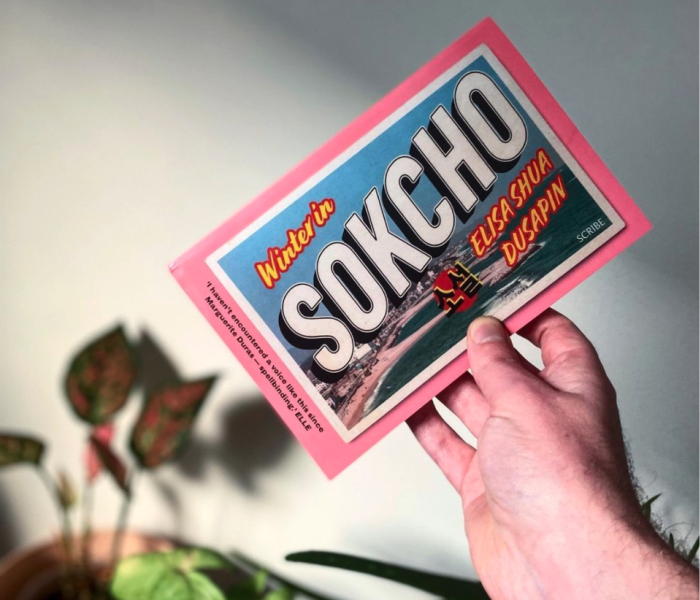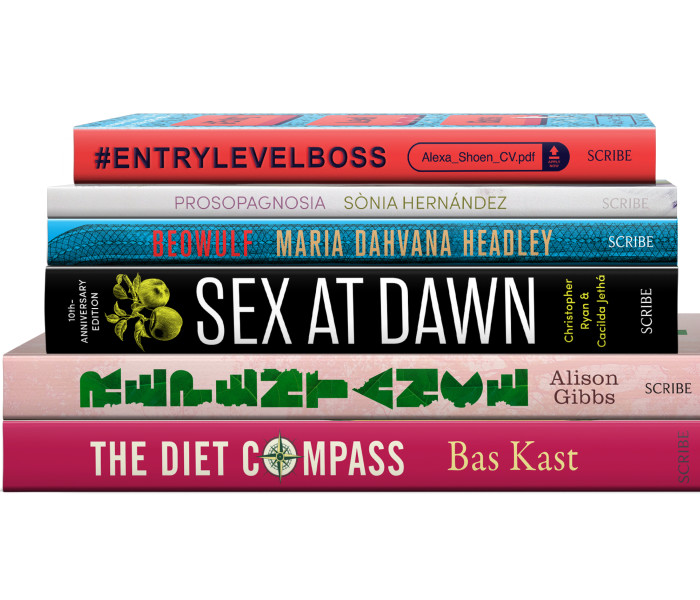‘Allied to a cunning ear for alliteration, this makes for a text of rollicking, restless verve. The masculine boasting, besting and butchering are duly in place, but Headley adds a sharp focus on the actions and motivations of the female characters ... Maria Dahvana Headley’s radical translation of Beowulf sets out to make you look again at the Norse epic … If you’ve ever struggled with the poem, this is the retelling for you, its ferocious clarity turning Beowulf into a Hollywood superhero.’
Rishi Dastidar, The Guardian
‘Bold … Electrifying.’
Ron Charles, The Washington Post
‘Compelling and persuasive … Maria Dahvana Headley’s new translation is bold, exciting and breathes new life into an old classic. With a more nuanced approach to some characters and some inspired language choices, Headley helps Beowulf reclaim its rightful place as a raucous and boozy crowd pleaser.’ FOUR STARS
Simon Clark, The AU Review
‘[A] bold and fabulous feminist translation … This Beowulf is a joy to read: Headley has loosened herself from the shackles of stuffy scholarship and archaic language (although do not be fooled – she is adept at understanding her source material) to provide a rollicking good yarn.’
Clarissa Sebag-Montefiore, The Saturday Paper
‘Maria Dahvana Headley has made an enthralling, scalding, contemporary epic; she combines newly-wrought ancient kennings with US street slang and lights up the women in the poem with unusual sympathy.’
Marina Warner, New Statesman 'Books of the Year'
‘Headley’s Beowulf is kindred in spirit to The Mere Wife— highly conscious of gender and modernised to the hilt — but totally different in form. Instead of changing names or places, Headley sticks closely to the original Old English text while updating the vocabulary with flourishes of internet humour … The feminism in Headley’s translation is embedded in the texture and language of the poem itself rather than in its individual events or characters … Her Beowulf is a tragicomic epic about the things men do to impress one another. It’s as fierce an examination of masculine weakness as The Mere Wife was of feminine strength.’
Jo Livingstone, Poetry Foundation
‘The author of the crazy-cool Beowulf-inspired novel The Mere Wife tackles the Old English epic poem with a fierce new feminist translation that radically recontextualises the tale.’
Barbara VanDenburgh, USA Today
‘I have a lot of things to say about Maria Dahvana Headley's new book, Beowulf… The first thing I need to tell you is that you have to read it now. No, I don't care if you've read Beowulf (the original) before … I don't care what you think of when you think of Beowulf in any of its hundreds of other translations because this — this — version, Headley's version, is an entirely different thing. It is its own thing.’
Jason Sheehan, NPR
‘The new Beowulf is incredibly exciting from beginning to end!’
Jason Furman, Harvard University
‘An iconic work of early English literature comes in for up-to-the-minute treatment … Headley’s language and pacing keep perfect track with the events she describes … [giving] the 3,182-line text immediacy without surrendering a bit of its grand poetry. Some purists may object to the small liberties Headley has taken with the text, but her version is altogether brilliant.’ STARRED REVIEW
Kirkus Reviews
‘It definitely isn’t your grandma’s Beowulf… Hooked from the first word … Headley's combination of alliteration, assonance, and consonance makes for verse that we can’t help but tap our feet and bob our heads to.’
Kwan Ann Tan, Asymptote
‘Finally, a Beowulf translation that leaves us feeling ‘hashtag: blessed’.’
Alena Smith, SLATE/Future Tense virtual event
‘Maria Dahavana Headley’s breathtakingly audacious and idiomatically rich Beowulf: a new translation is a breath of iconoclastically fresh air blowing through the old tale's stuffy mead-hall atmosphere.’
Mike Scroggins, Hyperallergic
‘Beowulf: a new translation pulls Beowulf into the fraught discourse on masculinity in the 21st century … Headley’s choice of backward-hatterd beer-soaked vernacular has its origins in the grandstanding language of the hero as we've always known him — a beefcake who wants to pull off such incredible feats that dudes will hype his reputation for centuries to come.’
Miles Klee, MEL Magazine
‘[L]ively and vigorous … I am delighted. I’ve never read a Beowulf that felt so immediate and so alive … It’s profane and funny and modern and archaic all at once, and its loose and unstructured verses are full of twisting, surprising kennings.’
Constance Grady, Vox
‘Of the four translations I’ve read, Headley’s is the most readable and engaging. She combines a modern poetry style with some of the hallmarks of Old English poetry, and the words practically sing off the page … Headley’s translation shows why it’s vital to have women and people from diverse backgrounds translate texts.’
Margaret Kingsbury, Buzzfeed
‘[A]s a poetic meditation on the poem, it’s full of startlingly powerful and often raucously lovely language.’
Steve Donoghue, Open Letters Review
‘The new translation of Beowulf by Maria Dahavana Headley is the best thing I've read all fucking year.’
Mike Drucker, TV Writer and Comedian
‘This is a version that is highly recommended, not so much to ensure you’re up with your classic education, but rather, for the sheer pleasure of the story and its execution … There’s nothing quite like reading the book.’
Magdalena Ball, Compulsive Reader
‘This latest reimagining of the epic is through the feminist lens of Maria Dahvana Headley. Bringing this ancient text up to date is no mean feat; Headley does it with flair, fury, and fresh relatability.’
Happy Magazine
‘Headley brings a directness, intensity, and rhythm to her translation that I haven’t seen before. This is what it must have felt like to sit in a mead hall and listen to a scop tell the tale. Other translations may be more scholarly, literal, or true to the poetic form of the original, but it’s been a thousand years since Beowulf was this accessible or exciting.’
Steve Thomas, The Fantasy Hive
‘Joy. That is the primary emotion I felt as I was reading Maria Dahvana Headley’s new translation of Beowulf… I cannot recommend this translation more highly. It is accessible to the reader who has never encountered Beowulf before, yet it intrigues and challenges those who study the poem professionally.’
David Wilton, WordOrigins.org
‘The sheer poetry lifts the reader into a realm that is both familiar and even enlivening.’ FOUR STARS
Carpe Librum
‘[An] incredible feminist interpretation.’
Keeping Up With the Penguins
‘Now science fantasy writer, Maria Dahvana Headley has cut through with a punk sensibility. Hers is a culturally radical reading with a feminist edge and it opens a pathway to a deeper historical reading.’
Barry Healy, Green Left
‘The critical aspect of this translation is that Headley uses language to bring the story vividly to life. Reinterpreting the text enables it to sing off the page, deploying verse and modern interpretations when necessary to recreate Beowulf as a flowing, visceral tale … a joy to read and highly recommended.’
Robert Goodman, Newtown Review of Books
‘In the wake of Seamus Heaney’s energetic and masterly translation 20 years ago, it took a brave writer to attempt a radically different one. But Headley’s engaging introduction to her almost rap-like version shows up many of the places where a translation can slant the original this way or that, and uses her own life and times as a starting point.’
Kerryn Goldsworthy, Sydney Morning Herald
‘Move over, Tolkien and Heaney. This translation of Beowulf into muscular urban slang is electric … The American novelist’s sharp new version slices clean and bright to the brutal heart of this ancient adventure like a sword snatched from the dull grey stone of academia.’
Helen Brown, The Telegraph
‘There is a glory and thrill to her verse, which brings the blood, fire and youthful energy of the original to the surface … a gift.’
Hetta Howes, TLS
‘Headley’s Beowulf demands to be read in one sitting … Barrelling along at breakneck speed, pulsating and breathless with excitement, it’s an outstanding poetic feat … It’s an astonishing world, and Headley offers us a uniquely powerful way into it.’
Carolyne Larrington, Literary Review
[T]here is precise scholarship at work here and a deep understanding of the language and style of the original poem – but Headley’s translation also injects new life into the epic … Headley is dragon-like in bringing her courage, grit and considerable poetic talent to the task of translation, yet also conveys plenty of its literary tradition … The Beowulf that emerges not only speaks to us but demands to be heard in our 21st-century moment. And what a captivating shout it is.’
Laura Varnam, History Today
‘Stupendous … exhilarating and dangerous.’
Philip Hensher, The Spectator
‘Her verse has a swaggering, street-smart bite.’
Alex Diggins, The Sunday Telegraph
‘Thrilling … she interrogates the text to great effect.’
Erica Wagner, New Statesman
‘Maria Dahvana Headley’s radical translation of Beowulf turns the old epic into a rollicking tale for today, grabbing your lapels from its very first word.’
Rishi Dastidar, The Guardian
‘Without sacrificing the rhythm, rhyme, and visceral language of the original, Headley’s spin is refreshing. Her use of contemporary slang and tempo make the ancient text appealing to a younger audience … For Headley to find a feminist angle in the midst of all this macho behaviour is a feat — but she does it … This is a translation that deserves a wide audience. It’s clear Headley had a lot of fun with this text, and it is to be hoped it lands on the school curriculum.’
Afric McGlinchey, Irish Examiner
‘Maria Dahvana Headley has satisfied the most deeply-felt and desired dream of any translator, to transfer into her language the words, feelings and cultural icons of a classic, lost tongue. Her Beowulf is wild and wiry, rich and ribald. It sings and dances, curtseys and copulates, although with a more graphic update of the latter, and it quite simply takes one's breath away … This Beowulf is born and eats from language at home in the world of the internet, robots, genes but maintains the alliterations and rhymes of traditional poetry, keeping the tradition alive and renewing it at the same time.’
Indran Amirthanayagam, judge in the Academy of American Poets' Harold Morton Landon Translation Award
‘An electrifying translation.’
The Telegraph
‘It’s awesome how strictly she follows the structure and rules while escalating the giddy gallop into a crescendo of overwhelming terror of the destructive marauder.’
Sue Prideaux, New Statesman
Praise for Maria Dahvana Headley:
‘Maria Dahvana Headley is a firecracker: she’s whip-smart with a heart, and she writes like a dream.’
Neil Gaiman
Praise for The Mere Wife:
‘There’s not a false note in this retelling, which does the Beowulf poet and his spear-Danes proud.’ STARRED REVIEW
Kirkus
Praise for The Mere Wife:
‘Vivid and thrilling.’
The Daily Telegraph



